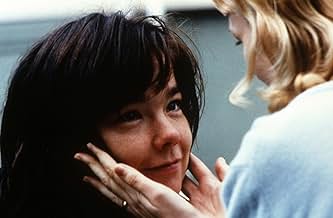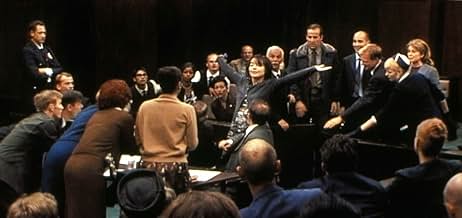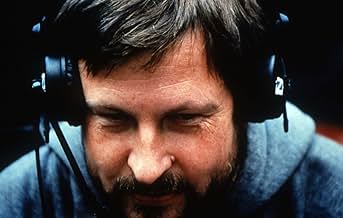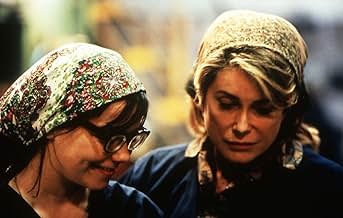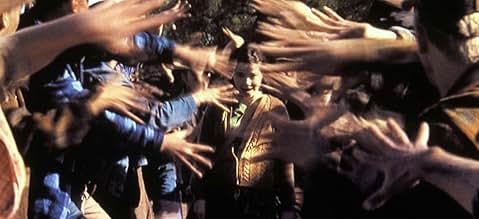Una ragazza dell'Est Europa va in America con il suo bambino, aspettandosi che sia come nei film di Hollywood.Una ragazza dell'Est Europa va in America con il suo bambino, aspettandosi che sia come nei film di Hollywood.Una ragazza dell'Est Europa va in America con il suo bambino, aspettandosi che sia come nei film di Hollywood.
- Regia
- Sceneggiatura
- Star
- Candidato a 1 Oscar
- 34 vittorie e 48 candidature totali
Siobhan Fallon Hogan
- Brenda
- (as Siobhan Fallon)
Recensioni in evidenza
The reviews were extremely black and white for this art-house film. People were either enthralled or bored to tears by the whole experience. There seemed to be no middle ground. Now, that's my kind of movie. Any picture that can reap awards (Cannes Film Festival) and get lambasted by the general public at the same time will always pique my interest. In respect, it was a rich, rewarding odyssey, much easier to get through than, let's say, even half of "8½."
My initial respect for the unique, uncompromising style of Danish director Lars von Trier goes back to his compelling work in "Zentropa" and "Breaking the Waves," both bleak, surrealistic studies of man vs. reality. His pieces usually center around some innocent, simple-minded, self-sacrificing soul who inevitably succumbs to the cruelties of life.
I found the central role of Selma (as played by the extraordinary Björk) to be very much the emotional equivalent of Emily Watson's touchingly childlike, near-sociopath Bess in "Breaking the Waves" -- blessed and cursed with a naive, soulful purity. Selma represents one of God's little quirks of nature. A bespectacled, pathetically infantile little ragamuffin completely out of touch, Selma has somehow survived like the runt of a litter would - through luck, will power, and the extreme kindness of those around her. An impoverished Czech-born emigré living in a small Northwestern U.S. industrial town during the mid-60s, this luckless creature manages to eek out a meager Airstream-like existence as a factory worker, despite the fact she is legally blind.
Selma is, amazingly enough, a mother. Seemingly ill-equipped to care for a child much less herself, she has nevertheless managed to provide for the 12-year-old boy, while nurturing the child as a young girl would her rag doll. The fairly adjusted boy suffers, however, from the same optic disease as the mother, while the crux of the story revolves around her attempts to save up money for his inevitable operation.
The fascination of "Dancer in the Dark" lies in Selma's musical world. With her eyesight failing, her ears become the only sense of joy, falling periodically into bouts of fantasy anytime she grabs onto a rhythm or beat (like machine sounds, train engines, etc.), wherein she becomes the star of her own working-class musical production. These compelling sequences become mere extensions of her real-life circumstances, i.e., the musical interludes at work will include the factory itself as a set piece and the other workers as her ensemble. A strange mix of Fellini neo-realism and Busby Berkeley illusion, these daydreams (sparked by Vincent Paterson's inventive choreography and von Trier's purposely puerile lyrics) become her only escape. Björk's odd musical talent and vocal style may be an acquired taste, but she is so mesmerizing here it becomes a non-issue. In addition, there are brief moments of levity as a hopelessly inept community theater production of "The Sound of Music" goes into rehearsals with the very awkward Selma playing Maria.
The subordinate cast is equally in tune. The wonderful, beguiling French star Catherine Deneuve downplays her ethereal beauty as Kathy, Selma's co-worker and trusted friend. And a strange, maternalistic friendship it is indeed, for this woman seems to have no other purpose in life than to be this girl's eyes and hands, looking out for her practically day and night. Peter ("Fargo") Stormare shies away from his ruthless killer image with this touching portrayal of a sensitive, almost pitiable boor who only has eyes for the ungainly Selma. David Morse is gripping as a seemingly compassionate but despairing policeman whose one desperate act involving neighbor Selma results in tragedy. Joel Grey has a brief, telling moment near the film's end as a faded musical star idolized by Selma.
As in his other featured works, von Trier's gritty, hand-held camera work may be dizzying to the point of distraction at first but its overall impact to the stark proceedings is unquestionable. Moreover, the grueling paces he puts his actresses through to achieve absolute truth borders on misogyny but the rewards are tenfold. As in the case of Emily Watson, Björk has never shined brighter as an artist.
A harrowing, refreshingly original piece of filmmaking that should be experienced by anybody who dares to be different.
My initial respect for the unique, uncompromising style of Danish director Lars von Trier goes back to his compelling work in "Zentropa" and "Breaking the Waves," both bleak, surrealistic studies of man vs. reality. His pieces usually center around some innocent, simple-minded, self-sacrificing soul who inevitably succumbs to the cruelties of life.
I found the central role of Selma (as played by the extraordinary Björk) to be very much the emotional equivalent of Emily Watson's touchingly childlike, near-sociopath Bess in "Breaking the Waves" -- blessed and cursed with a naive, soulful purity. Selma represents one of God's little quirks of nature. A bespectacled, pathetically infantile little ragamuffin completely out of touch, Selma has somehow survived like the runt of a litter would - through luck, will power, and the extreme kindness of those around her. An impoverished Czech-born emigré living in a small Northwestern U.S. industrial town during the mid-60s, this luckless creature manages to eek out a meager Airstream-like existence as a factory worker, despite the fact she is legally blind.
Selma is, amazingly enough, a mother. Seemingly ill-equipped to care for a child much less herself, she has nevertheless managed to provide for the 12-year-old boy, while nurturing the child as a young girl would her rag doll. The fairly adjusted boy suffers, however, from the same optic disease as the mother, while the crux of the story revolves around her attempts to save up money for his inevitable operation.
The fascination of "Dancer in the Dark" lies in Selma's musical world. With her eyesight failing, her ears become the only sense of joy, falling periodically into bouts of fantasy anytime she grabs onto a rhythm or beat (like machine sounds, train engines, etc.), wherein she becomes the star of her own working-class musical production. These compelling sequences become mere extensions of her real-life circumstances, i.e., the musical interludes at work will include the factory itself as a set piece and the other workers as her ensemble. A strange mix of Fellini neo-realism and Busby Berkeley illusion, these daydreams (sparked by Vincent Paterson's inventive choreography and von Trier's purposely puerile lyrics) become her only escape. Björk's odd musical talent and vocal style may be an acquired taste, but she is so mesmerizing here it becomes a non-issue. In addition, there are brief moments of levity as a hopelessly inept community theater production of "The Sound of Music" goes into rehearsals with the very awkward Selma playing Maria.
The subordinate cast is equally in tune. The wonderful, beguiling French star Catherine Deneuve downplays her ethereal beauty as Kathy, Selma's co-worker and trusted friend. And a strange, maternalistic friendship it is indeed, for this woman seems to have no other purpose in life than to be this girl's eyes and hands, looking out for her practically day and night. Peter ("Fargo") Stormare shies away from his ruthless killer image with this touching portrayal of a sensitive, almost pitiable boor who only has eyes for the ungainly Selma. David Morse is gripping as a seemingly compassionate but despairing policeman whose one desperate act involving neighbor Selma results in tragedy. Joel Grey has a brief, telling moment near the film's end as a faded musical star idolized by Selma.
As in his other featured works, von Trier's gritty, hand-held camera work may be dizzying to the point of distraction at first but its overall impact to the stark proceedings is unquestionable. Moreover, the grueling paces he puts his actresses through to achieve absolute truth borders on misogyny but the rewards are tenfold. As in the case of Emily Watson, Björk has never shined brighter as an artist.
A harrowing, refreshingly original piece of filmmaking that should be experienced by anybody who dares to be different.
This is quite possibly the most moving film I've seen, it ensnares you within the first minute, or Bjork does with her interpretation of the sound of music, which is both hilarious and introduces one of the main themes: the magic of musicals. Not one of my favourite genres (but everyone loves The Sound Of Music, right?) but Lars Von Trier makes you re-evaluate your perception with a gentle loving pastiche of the way for no reason people and things in musicals spontaneously erupt into song, made more credible in this film by implicating a reason for it: Bjork's character is going blind so she hears music in the slightest thing and she, in her mind, sees how moves should be choreographed with the music she hears, reminiscent of her own It's Oh So Quiet' music video. And the best thing about this film is the way Bjork charms you with her portrayal of the nicest person in the world, she will do anything for you if she could. She is essentially an innocent and though this is her weakness you can't help but love her all the more: a sparkling performance from a unique singer in real life.
However from this don't assume that this is a light happy film as there is a dark tragic side also, and this side is full of injustice, agony- and I mean agony-, sorrow- like you'd not believe-, and an intense emotional pull as I've ever felt in a cinema before, and it's this half that propels it from being just a great film to becoming one of the greatest. Its greatness is in telling a simple story of a woman trying to stop her own genetic sight disorder afflicting her son, by working every hour to afford the operation, working heavy machinery despite essentially being virtually blind, its greatness is its ability to inflict upon you the gift of feeling every conceivable emotion you posses and you do, you really do experience so much during this film. But I'll not say too much as my enjoyment of this film increased due to, for a change, not second guessing what would happen but to just let it be, I would say to passively watch but there's nothing passive about this film. It really moves you. It makes you feel alive.
This film should be seen alone, in the quiet when you are all by yourself, but more importantly than that it should be seen: this is more than mere movie this is art this is real this is the greatest film I have ever seen: even better than Casablanca, and Shadowlands, and The Piano.
However from this don't assume that this is a light happy film as there is a dark tragic side also, and this side is full of injustice, agony- and I mean agony-, sorrow- like you'd not believe-, and an intense emotional pull as I've ever felt in a cinema before, and it's this half that propels it from being just a great film to becoming one of the greatest. Its greatness is in telling a simple story of a woman trying to stop her own genetic sight disorder afflicting her son, by working every hour to afford the operation, working heavy machinery despite essentially being virtually blind, its greatness is its ability to inflict upon you the gift of feeling every conceivable emotion you posses and you do, you really do experience so much during this film. But I'll not say too much as my enjoyment of this film increased due to, for a change, not second guessing what would happen but to just let it be, I would say to passively watch but there's nothing passive about this film. It really moves you. It makes you feel alive.
This film should be seen alone, in the quiet when you are all by yourself, but more importantly than that it should be seen: this is more than mere movie this is art this is real this is the greatest film I have ever seen: even better than Casablanca, and Shadowlands, and The Piano.
A superb piece of 2000 cinema, and a worth Cannes winner. Bjork is absolutely perfect as the vulnerable but sympathetic heroine. I won't spoil the plot, but you don't expect to end up where the film takes you. There didn't seem to be a dry eye in the house. The music is slightly spoilt by Lars Von Trier's lyrics, but Bjork puts some life into the tunes. This has had an appalling critical response in the U.K. It put me off going for 2/3 weeks. I do feel that Bjork can arouse resentment in people. Perhaps the establishment (French, Walker, Norman etc) needs to go, and be replaced by some fresh blood.
10Outi
It feels awkward to attempt to put Dancer in the Dark into words. Von Trier's film is one of those movies that truly change the way we think about cinema and its possibilities, and for such a film, words do no justice. Dancer in the Dark centers around Selma (Björk), a factory worker, who loves her 10-year-old son above everything else in the world. Selma is a happy, innocent creature who enjoys musicals for "nothing bad ever happens in them". These elements (mother's love for her son, joyfulness of musicals versus the hardships of every day life) create a whole unlike anything ever seen on silver screen. Selma is rapidly losing her eye sight, but not her vision: she's the 'dancer in the dark' who is prepared to sacrifice herself to keep the light in her child's eyes. Very early on it becomes obvious that this story can't have a happy ending. However, once you've accepted it, you can put your mind at ease and see the film as it unfolds from Selma's point of view. And what a view it is! Björk gives a performance of a life time - this little woman with a huge voice is all emotion all the time without ever appearing overtly dramatic or cheaply sentimental. There's no weak link in the rest of the cast either, Peter Stormare as Jeff, Catherine Deneuve as Kathy and Siobhan Fallon as the prison guard to name but a few. The biggest star is still the director himself; von Trier demonstrates his talent in a superb fashion by both telling a simple story that will most likely break you heart and examining the ever-persistent ills of the life of the lower class of the American society. What about the film's musical character then? This is where von Trier triumphs the most by understanding the very essence of the whole genre - hope; hope that will live in our soul for ever if we'll only follow our heart.
Dancer in the Dark haunted me. This film was an amazing view into the human mind as well as a tragic story of hopeless hope, betrayal by others, and still remaining true to yourself. Bjork produces an inspirational performance, of which one would never think she is not primarily an actress. Some of her moments in this film bring you to tears with their absolute honesty. The ensemble cast are a godsend as well. Peter Stormare, Catherine Denevue, and David Morse in particular. Morse, playing the most varied and difficult character, succeeds with apparent ease. The only complaint I had of the film is that it was slightly drawn out and slow paced. However, it is still spiked with moments of surprise that knock you so hard, you are pulled back in immediately. With an incredible closeness to these people, Dancer in the Dark will make you think and stretch your emotions to the limit.
Lo sapevi?
- QuizIt took Lars von Trier a whole year to convince Björk to play the lead role.
- BlooperSelma's son's surname should be Jezek, not Jezková.
- Citazioni
Lines on screen: They say it's the last song. They don't know us, you see. It's only the last song if we let it be.
- Versioni alternativeThe film originally contained a song entitled "141 Steps"; however, after the Cannes premiere, director Lars von Trier decided to shorten it, and the song was subsequently reworked and retitled "107 Steps."
- Colonne sonoreOverture
Written by Björk
Arranged, Orchestrated & Conducted by Vincent Mendoza
Produced by Björk
Mixed by Mark Stent (as Mark "Spike" Stent)
Published by Universal Music
I più visti
Accedi per valutare e creare un elenco di titoli salvati per ottenere consigli personalizzati
- How long is Dancer in the Dark?Powered by Alexa
Dettagli
- Data di uscita
- Paesi di origine
- Siti ufficiali
- Lingue
- Celebre anche come
- Bailando en la oscuridad
- Luoghi delle riprese
- Aziende produttrici
- Vedi altri crediti dell’azienda su IMDbPro
Botteghino
- Budget
- 12.800.000 USD (previsto)
- Lordo Stati Uniti e Canada
- 4.184.036 USD
- Fine settimana di apertura Stati Uniti e Canada
- 91.612 USD
- 24 set 2000
- Lordo in tutto il mondo
- 40.061.153 USD
- Tempo di esecuzione2 ore 15 minuti
- Colore
- Mix di suoni
- Proporzioni
- 2.35 : 1
Contribuisci a questa pagina
Suggerisci una modifica o aggiungi i contenuti mancanti

Divario superiore
By what name was Dancer in the Dark (2000) officially released in India in Hindi?
Rispondi

